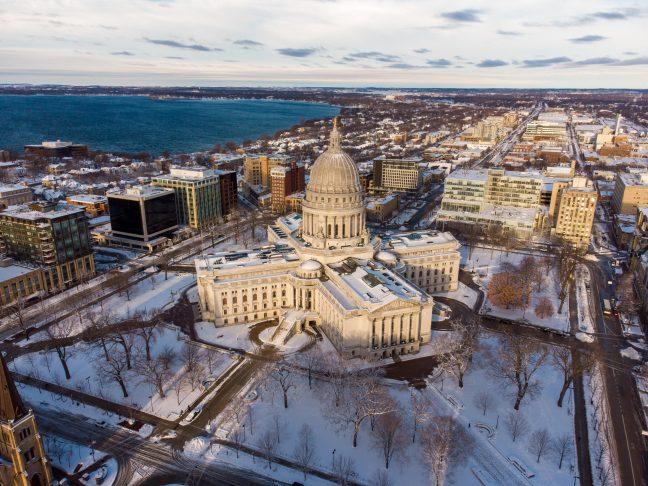The Wisconsin Legislature voted March 23 to take control of $3.2 billion allotted to Wisconsin in the March 10 stimulus bill from Gov. Tony Evers in a move that could change how the money will be spent. The State Assembly also passed bills which would prevent employers and the government from mandating COVID-19 vaccinations and outlawing church closures due to the pandemic.
The Assembly’s bill to control stimulus spending calls for the governor to submit a spending plan to the Republican Legislature’s budget committee for approval. Republicans feel Gov. Evers would spend the money in his own party’s interests and threatened to take the issue to court if he didn’t sign their bill.
How money is spent will dictate how quickly Wisconsin will recover from its economic recession. Republican Assembly Speaker Robin Vos said in an Associated Press article Democratic control of the money would fail to benefit the entire state.
As COVID-19 crisis increases wealth gap, WI must reform social welfare programs
“Unfortunately, it seems like the Democrats want to have a piggy bank where they can choose to give the money with no oversight, no transparency, no ability to judge whether it’s the best decision until after the money is out the door,” Speaker Vos said in the article.
Gov. Evers is expected to veto both the Legislature’s attempt to control stimulus money and the Assembly’s recent bills. But, these conflicting interests represent years of unproductive tension between the state executive branch and its Legislature that have even more significant consequences for Wisconsinites who have been affected by the pandemic.
The March stimulus package was passed to provide funds for direct payments, unemployment relief, tax breaks and COVID-19 vaccine distribution to support all Americans. The additional funds provided to states are meant to expand this support in ways unique to each state, yet this relief is challenged when governments prioritize party interests over their constituents.
Gov. Evers’ plan to reverse Act 10 could protect Wisconsin unions and workers
This could get in the way of the State’s recovery from its current economic and health crises. The Assembly’s recent bill trying to prevent employers and the government from mandating vaccinations shows a Republican-controlled spending plan might not prioritize funding for vaccination deployment.
This choice would both put thousands at risk of contracting COVID-19 and delay a return to normal life.
Since COVID-19 vaccines were given FDA emergency use authorizations and not formally licensed along the same timeline as past vaccines, it’s reasonable institutions shouldn’t be able to require people to take the vaccine. But the various COVID-19 vaccines range from 66-95% in effectiveness and are largely safe, with only rare cases of complications.
Evers proposed budget rightfully promotes funding for new UW buildings, infrastructure
Republicans have let partisanship get in the way several times throughout the past year, such as when they introduced bills restricting absentee voting, despite it making the election more accessible for all voters.
This past partisanship raises the question of whether Republican lawmakers would utilize economic relief in a way that benefits all wisconsinites.
On the other hand, Gov. Evers having full power in choosing where the money goes could also lead to partisan spending.
Evers has a history of using important funds to push agendas that fail to satisfy both Republican and Democratic interests, despite his role in representing the whole state. In his 2021-2023 budget proposal, Evers prioritized legalizing marijuana and in 2019 he tried to increase the state gas tax by 8 cents per gallon.
A 1930 state constitutional amendment gave the Wisconsin governor some of the strongest veto power in the country and Gov. Evers has often used this option to avoid cooperation with Republican legislators. He recently vetoed a $100 million Republican-led COVID-19 response bill before calling for compromise in the government.
Democrats, Republicans must compromise on divided new COVID relief package
While showcasing Wisconsin’s equal mix of Republican and Democratic values that don’t show up in most blue coastal states or red midwestern states, these partisan divides have gotten out of hand as they threaten the government’s role in supporting the people in times of need. The Legislature and Gov. Evers can’t play partisan games when the state is in its worst condition in decades.
According to a recent report on Wisconsin’s economy, the statewide GDP dropped 11.4% in 2020 as many businesses in the service sector either had to go out of business or fire employees. The report also found Wisconsin’s economy has been at its worst point since the Great Depression.
Basic economic wellbeing, when considering consumer spending and employment rates, affects everyone and is about as bipartisan an issue as it gets. Public health is also bipartisan, yet Wisconsin’s government has continually proved gaining popularity points through partisan moves is more important to them than actually supporting the people that elected them to office.
American Rescue Plan shows hope as the country reaches one year of a pandemic
The Legislature shouldn’t have full control over stimulus money and neither should Gov. Evers. But since Gov. Evers is set to veto the Legislature’s bills, he must meet with these lawmakers and find common ground to spend this money in ways benefiting people on both sides of the aisle.
Partisanship is corrupting America’s national, state and local governments to the point where they barely even work. Unlike COVID-19, there is no vaccine on the horizon for partisanship and it’s time to start compromising on issues that should bring us together.
Will Romano ([email protected]) is a freshman studying economics and journalism.














